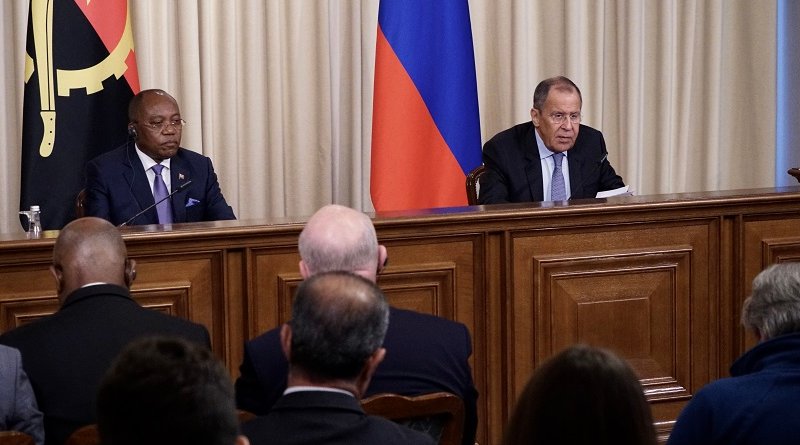Russia Expresses Satisfaction Cooperating With Angola – OpEd
Russian Foreign Minister Sergey Lavrov and his Angolan counterpart Manuel Domingos Augusto have held talks in Moscow to review and discuss economic cooperation between the two countries and ways to resolve conflicts in Africa.
Lavrov and Manuel Augusto paid a special attention to trade, economic, investment and mining cooperation between Russia and Angola, as well as to business ties between the two countries’ regions. In addition, they discussed preparations for the Russia – Africa Summit scheduled to take place in Sochi in October.
Russia’s Black Sea resort of Sochi will host the first Russia-Africa Summit on October 24. The leaders of more than 50 countries of the region have been invited, 35 of whom have confirmed their participation. Presidents Vladimir Putin and Abdel Fattah al-Sisi, who is presiding over the African Union in 2019, will co-chair the summit.
Lavrov further noted the high and growing standards of mutual understanding and mutual trust between Russia and Angola. He said they had spoken at length about the specific fields of bilateral collaboration, primarily those where cooperation was put down on paper during the official visit of President of Angola Joao Lourenco to Russia in April of this year and his talks with President Vladimir Putin.
According to reports, President Putin and President Lourenco held talks during the Angolan leader’s visit to Moscow last April. After the April summit, Putin immediately instructed all the ministries and agencies concerned to work out the practical implementation of all the agreements reached with Lourenco.
“Both of us called for strengthening our political dialogue. We agree that our trade and economic ties are growing ever stronger, which meets our mutual desire to advance our business partnership even further,” Lavrov said.
According to the minister, Russian companies have shown considerable interest broadly in the Angolan market, and would continue helping establish direct contacts between business communities in Russia and Angola.
The Russian-Angolan Business Council, which was established in March this year, will hold an interactive meeting between the Russian and Angolan companies to further look at deepening economic cooperation on the sidelines in Sochi.
On other significant areas, both ministers have agreed on the improvement of contractual legal framework in various areas, such as mutual recognition of diplomas, the establishment and operating terms of culture and information centers, cooperation in crisis management, the peaceful use of nuclear energy and commercial shipping.
On education and training, Lavrov pointed out the positive practice and experience of training Angolan professionals at Russian universities, where some 1,120 Angolans are currently being educated. In addition to this, several score of Angolans are studying at the universities of the Russian Ministry of the Interior.
They further used the opportunity to look at other key issues on the international and regional agenda with an emphasis on the settlement of crises in African hotbeds.
The two ministers exchanged views on regional and global issues of mutual importance, focusing on ways to resolve crises in Africa’s trouble spots, including the Democratic Republic of the Congo, the Central African Republic, South Sudan and Somalia.
According to the Russian Foreign Ministry, the two countries maintain meaningful political dialogue based on “similar views of global processes and similar approaches to forming a fair world order, commitment to the primacy of international law and the principle of non-interference in the domestic affairs of sovereign states
The Angolans gave an assessment of the situation in Africa, especially in such hot spots as the Congo and Africa’s Great Lakes, the Central African Republic and others. While Russia has greatly appreciated the active peacekeeping role of Angola in helping to resolve conflicts on the African continent, still Africa’s problems requires a comprehensive approach, which should involve coordinated action by Africans themselves, and of course, with support from the international community.
As expected, one of the key priorities is to help Africans deal with their problems – crises, conflicts and other situations. Thus, Lavrov has reaffirmed the government readiness to continue to contribute, including as a permanent member of the UN Security Council, to the consolidation of stability and security in Africa.

